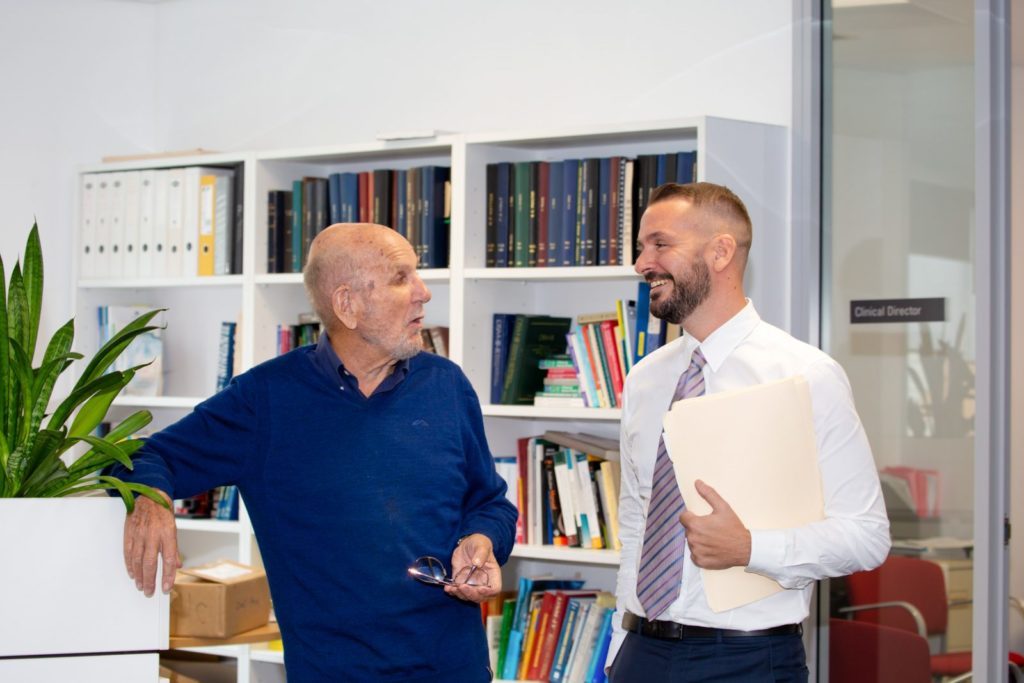Helping 9,800 Clinicians and 36,000 Individuals

THIS WAY UP provides online courses for a variety of mental health disorders using Cognitive Behaviour Therapy. Jointly designed and developed by Professor Gavin Andrews and his team of psychiatrists and clinical psychologists in 1998 – originally as ‘CLIMATE’ (Clinicians’ Mate) – the organisation has been in operation for over two decades and has had more than 9,800 clinicians and 36,000 individuals accessing the platform.
Emeritus Professor Gavin Andrews, is a giant in the mental health field. Over the course of his career he not only founded THIS WAY UP and CRUfAD (Clinical Research Unit for Anxiety and Depression), but he also published more than 600 papers and is on the ISI highly cited researchers’ list with more than 45,000 citations to his work. In 2018, shortly after retirement, he received the Australian Mental Health Prize.
To put things in context, THIS WAY UP and CRUfAD (Clinical Research Unit for Anxiety and Depression) operate under the umbrella of Sydney’s St Vincent’s Hospital and the University of New South Wales. CRUfAD is an anxiety and depression research arm and THIS WAY UP operates as the front line of CRUfAD’s research efforts – offering virtual courses underpinned by CRUfAD’s learnings.
A Conversation with Clinical Director, Dr Michael Millard
To find out more about how exactly THIS WAY UP helps clinicians and their patients, I talked to Dr. Mike Millard who took over as Clinical Director of THIS WAY UP after Professor Gavin Andrews’ retirement in 2018.
Beginning his career as a GP, Dr. Millard explains, “I initially worked in general practice, but soon realised that the consultations I was most interested in were more psychiatric. So I decided the best way to improve my skills and focus on the cohort of people I was most interested in helping was to complete my psychiatric training”.
Dr. Millard was later awarded a prestigious research fellowship at CRUfAD under the stewardship of Professor Gavin Andrews. “It was my opportunity to really develop my skills in cognitive behavioural therapy, evidenced-based care and understand the power of digital interventions”, he explains.
Today, as Clinical Director of THIS WAY UP, Dr. Millard overseas all of the courses. He also retains a direct relationship with patients, spending a couple of days each week in clinic, to ensure he always has a finger on the pulse.
How THIS WAY UP’s courses work
“Our three most commonly accessed courses are our depression, our mixed anxiety and depression – so that’s our trans-diagnosis courses – and our GAD, which is generalised anxiety disorder. They’re probably the three biggest ones that people use. That’s really a reflection of being the most common disorders we see”, explains Dr. Millard.
In terms of actually using the courses, Dr. Millard shares that there are two ways people can access the materials. Individuals can complete a course as a self-help option, meaning they can access the website and choose a course on their own. Alternatively there is a decision-support tool that helps people to check where they’re at using validated measures.
After completing a couple of questionnaires, the site provides suggestions about what course might be useful for them. Alternatively, consumers can do courses where their clinician supervises and supports them through the course.
The structure of all the patient courses are similar. Dr. Millard explains, “They’re all 6 lessons long – each consists of an illustrated story about two characters who have symptoms that are similar to the user. Over the course you follow their recovery journey, ending with a do-it-yourself guide after each lesson that helps people to apply the skills to their own lives.”
Dr. Millard is careful to explain that in-person consultations continue to play an important role. He shares, “In my practice I get a patient to do a lesson or two in between each of my appointments and then when they come to see me, I help them to apply the skills to their life.”
The concept of ‘blended learning’ allows Dr. Millard and the THIS WAY UP team to replicate real-world situations and accelerate the application of learned skills. Dr. Millard explains, “In education, the idea of blended learning is that you use technology to take the teaching of skills out of the classroom and you use the class to do applied learning. The therapy relationship is actually very similar. Part of the treatment is teaching new skills. However, the hard bit, and often the real benefit in treatment, is from the patient actually going out into their life and applying those skills.”
The idea is to make all interactions as fruitful as possible. Dr Millard explains, “More often than not I see people who have been seeing a psychologist for years without improvement, but the reality is they’re only seeing them once a month.”
“For a treatment like cognitive behavioural therapy, we need to be doing something more frequently, which is when digital intervention can be very beneficial at keeping the momentum from what comes out of those face-to-face appointments.
“I see a benefit to using our digital intervention to teach patients skills outside of the therapy room and then using face-to-face therapy as a way to help people apply these skills to their daily lives.
Furthermore, the implementation of blended learning at THIS WAY UP is a direct response to the distractions that can often derail patient-clinician relationships. Dr. Millard begins, “Often a consultation is spent empathising with or hearing how the patient’s week has been and dealing with the current crisis. It’s very hard to actually get around to teaching someone the evidence-based skills that we know make a difference.”
Blended learning that’s achieving real results
Dr. Millard explains, “One of the exciting things that’s come out in the last couple of months is the College of Psychiatry’s clinical practice guidelines for anxiety. They’re the first clinical practice guidelines that recommend digital cognitive behavioural therapy as the first step in the stepped care model. So I think that’s pretty exciting.
“And that’s because a lot of research has been done to show that internet-based CBT is as effective as face-to-face CBT. However, I think we should now be talking about what happens when we add both together – because the outcomes are even better.
“One of the brilliant things around using an online treatment is we can actually check peoples’ progress as they go”, Dr. Millard shares. “When people are using our website we’ve got a lot of inbuilt safety mechanisms. Before each of the six lessons, people are completing a K10.
“We also use other disorder specific measures to gauge people’s progress. If the stress scores are going up then we’ve got automated systems that encourage the patient to go to their clinician or access more intensive support.”
At this stage, the numbers look very encouraging. “We’re in the process of looking at a big study to tell us exactly how much support is best to get the most out of digital interventions,” Dr. Millard shares. “Our strength is the fact that every course that we’ve had has gone through at least one randomised controlled trial, and every recommendation we make is heavily evidence-based.
The research shows that 80% of people who finish a course have a significant reduction in their symptoms and 50% no longer qualify for a diagnosis of their disorder.
“That’s a similar process to medication trials, so that’s pretty good”. This said, Dr. Millard is careful to explain the focus of the courses is on long-term recovery, rather than short-term solutions. “We’re teaching people to manage their own mental health, so we’re really retaining self-efficacy with the patient and I think that’s quite a powerful position for people to be in”.
Courses and resources for GPs
THIS WAY UP also places a strong emphasis on empowering health professionals. “We have recently released a new course that teaches health practitioners how to do CBT in their own practice”, Dr. Millard explains. “It takes you through the core components of CBT and how to use them with your patients. So we encourage clinicians to register if they’re interested in improving their own face-to-face skills.
“We also have an extensive library of worksheets, which are all available for free for clinicians to use, so this is really around the idea of helping clinicians to treat their patients better. It would be great for GPs to improve their skills and confidence to feel that they’re able to either supervise or just recommend our courses as a strong evidence-based treatment alternative to medication.
“I often encourage people to think of digital interventions the same way as medication. In terms of, it’s important to check in on your patients a week or two after you’ve recommended a course to see how they are going. They may need some encouragement, much the same way someone would if you were taking them through using tablets.”
Reboot: Helping to fight waiting lists for chronic pain
One of the most exciting things is THIS WAY UP’s new course for chronic pain syndrome, which is helping to alleviate the burden of long waiting lists. Dr Millard explains, “One of the exciting things about being embedded in a hospital [St Vincent’s Hospital Sydney] is that we are able to collaborate with different areas of the hospital.
“A few years ago we thought, ‘Why can’t we do something online for chronic pain?’ So we approached the St Vincent’s Pain clinic and worked with them to take their pain program and put it online. It was very much a collaboration within our Department of Pain Medicine with psychologists and physiotherapists – it’s entirely multi-disciplinary and it’s called Reboot.”
Reboot has become a useful resource for many. Dr. Millard explains, “The Queensland Governments are using Reboot routinely. People are recognising that we need alternatives to medication and the pain clinic waiting lists are huge. Now, we have something that people can do while they’re waiting for their pain clinic appointment and it works.
“In terms of talking about waiting lists, we used to have a massive waiting list for our clinic. That was partly where the idea came around – ‘What are we going to do for these people that are on the waiting list? Okay, let’s get the ball rolling through online intervention’. As that research has gone on and on we’ve found it to be more and more effective.”
Parting words for GPs
Dr. Millard’s parting message for GPs is to consider leaning on evidence-based programs such as THIS WAY UP as a supplemental method of treatment. He explains, “Our overall purpose is basically to remove as many barriers to accessing effective psychological treatment as possible. Our strength is the fact that every course that we’ve had up has gone through randomised controlled trials – we’re heavily evidence based – so when we say that we think something works, we know it does.
“I think that’s an important point because there are thousands of online interventions, but only a very small number of them actually have any evidence behind them to say that they work, and for medical practitioners, I think that’s very important.”



